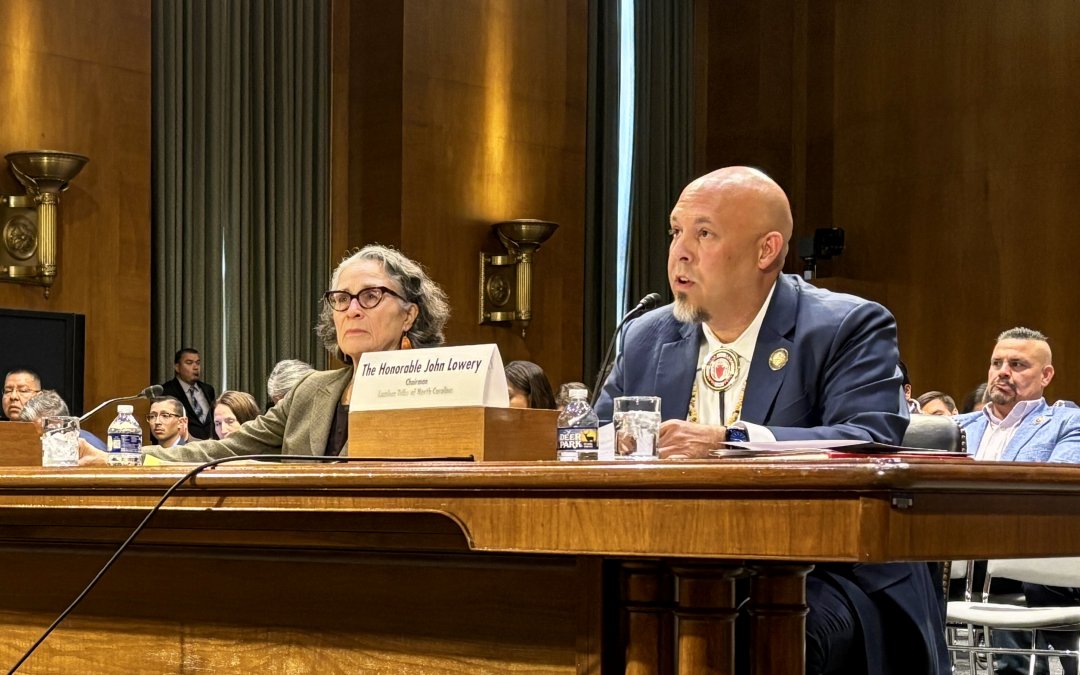WASHINGTON — The Senate Committee on Indian Affairs heard from Native American leaders and representatives Wednesday about whether Congress should recognize the Lumbee Tribe of North Carolina and make them eligible for national services and benefits.
The testimony will help senators decide whether to approve the Lumbee Fairness Act, which the House passed in September.
The bill seeks to amend the Lumbee Act passed in 1956, which recognized the Lumbee Tribe but prohibited the U.S. from extending national services and benefits to the Lumbee that are normally given to federally recognized tribal nations.
“This problematic language of determination here continues to hinder us today, placing the Lumbee in a legal limbo that only Congress can resolve,” John Lowery, chairman of the Lumbee Tribe, said.
He and Arlinda Locklear, the tribe’s attorney and a member of the tribal nation, testified in support of the Lumbee Fairness Act.
The Lumbee live in southeastern North Carolina, along the Lumbee River. Currently, there are over 60,000 members enrolled in the tribe, Lowery said.
There are two avenues through which a tribe can be recognized by the U.S. government: an act of Congress or an administrative process through the Office of Federal Acknowledgement (OFA), housed within the Department of the Interior, that examines the genealogy and history of a tribe.
Michell Hicks, principal chief of the Eastern Band of Cherokee Indians, and Ben Barnes, chief of the Shawnee Tribe, testified before the Committee that the Lumbee should be recognized through the administrative route rather than an act of Congress.
“There’s too many gaps in the genealogies,” Hicks said. “There’s too many gaps in the history. There’s no treaty relationships. Lumbee does not have a sister tribe in Oklahoma. There’s so many things here that need to be evaluated. That’s the importance of why it needs to go through the OFA process.”
Hicks said while he believes there may be Native ancestry, he does not consider the Lumbee a tribe because they lacked a continuous form of government, language, name and history.
“If Congress passes this bill, this group would be the first in American history to receive federal recognition without demonstrating any descent from an historical tribe,” Hicks said. “This is not fairness. It is abandonment of every safeguard that protects tribal sovereignty and identity.”
Locklear said the Lumbee Tribe descends from Siouan-speaking tribes like the Cheraw.
Although the tribe has used several different names over the last century, she said most of them were imposed by the state of North Carolina and that tribal members chose to identify as Lumbee in the 1950s.
Sen. Markwayne Mullin (R-Okla.), a member of the Cherokee Nation, said the issue of questioning tribal identity was personal.
“We were wronged a long time ago by the United States, and we’ve been fighting for recognition for a long time,” Mullin said. “When we have in-house fighting, it causes Congress sometimes to have an impasse. All we’re saying is the Lumbees have the right to be recognized, just like you have the right to be recognized.”
Currently, Congress funds agencies like the Indian Health Service and the Bureau of Indian Affairs, which helps tribal members with employment, agricultural development and more.
In 2022, the Congressional Budget Office estimated extending services to the Lumbee Tribe would cost agencies an additional $363 million over a four-year period — a number Hicks said was an underestimation. He added that the additional funding would divert resources away from other tribal nations.
Senators across the aisle acknowledged that the cost was a valid concern to raise before Congress.
“That’s a real issue,” Vice Chairman Sen. Brian Schatz (D-Hawaii) said. “It’s just not a reason not to grant recognition.”
North Carolina recognized the Native American nation in 1885, but the Lumbee Tribe’s fight for federal recognition has lasted over a century.
In 1888, leaders of the Lumbee Tribe first advocated for federal recognition and benefits.
When President Dwight Eisenhower signed the Lumbee Act into law, the tribe was left in limbo. The Lumbee Act was passed during the “termination era” — 15 years in the 1950s and 1960s when Congress cut off relations with 109 Native American nations. Congress has since reestablished connections with these tribes, except for the Lumbee.
In 2019, a bill to extend full federal recognition and benefits passed the House and was introduced to the Senate, but it did not progress beyond the Committee on Indian Affairs.
“I am the descendant of Solomon Locklear Sr., one of 44 tribal leaders who, in 1888 … petitioned Congress to recognize the Lumbee Tribe, an essential step towards securing federal funding for our children’s education,” Lowery said. “Today, 137 years later, I stand before you once again advocating for justice and equal treatment.”
If the Senate committee votes in favor of the bill, it will be sent to the Senate Floor for a full vote.


